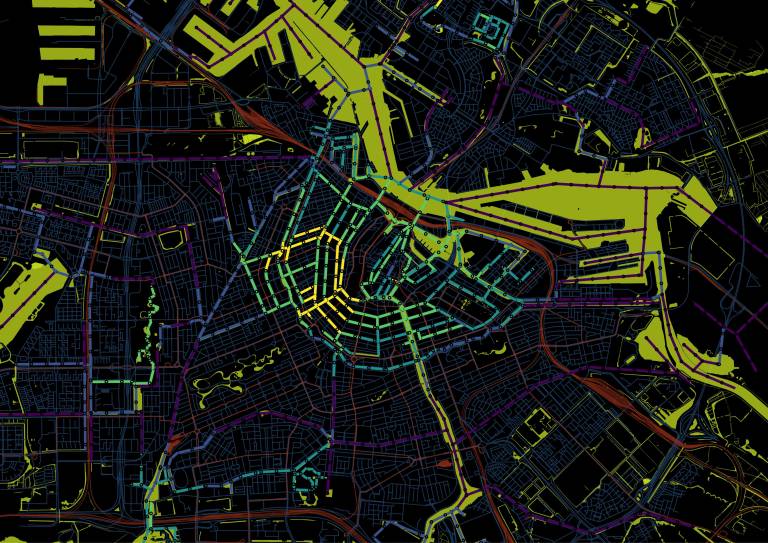 Research
Research

Subject
Investigation of the Spatial and Socioeconomic Impact of Waterway Networks on Cities
First and second supervisors
Abstract
In the historical cycle, cities with waterways have played a locomotive role in global international trade and, on the other hand, have provided a setting for people from various places and countries to come together due to their open and dynamic nature. The ports, industrial areas and the city centre have been indeed a unity with direct connections. However, changing circumstances, particularly the development of railways and motorways, have weakened the link between the city centre and its waterfronts over time. The alarming impact on the urban waterways and waterside areas has been increasingly recognised in diverse fields of knowledge.
The research offers a combined framework that is built through a series of case studies of cities with man-made waterways specially selected and designed to allow the pursuit of theoretical and analytical questions: “How do the man-made urban waterways affect the urban growth patterns of cities over time?”, “How does it relate to the building form and socioeconomics of cities?” and specifically, “What kind of difference can be found between different spatial systems with regard to man-made waterway integration? The study aims to make a quantitative comparison of cities and the distribution of street, waterway, building and land use types based on the centrality measures by applying multi-layered urban models. The research develops a multi-modal network of cities that combines the street, waterways and railways to understand the contribution of canals to the urbanisation pattern of different types of cities.
In that sense, the study can provide a valuable contribution to the future of waterway structures and waterfront settlements in which it will provide designers with a better understanding of principles and knowledge of systematic consequences for strategic design decisions. Also, the study enables a proposal of possible insights into the adaptation of disused, leftover, or deprived waterways and waterfront areas. This study will also explore key characteristics of urban waterways for integrating water transit systems into the existing public transport system and assess water transport options for cities with regard to city structure and existing land mobility networks.
Biography
Merve Okkali Alsavada is an architect and PhD researcher in the Space Syntax Laboratory at The Bartlett School of Architecture. She is also currently a Post-Graduate Teaching Assistant for Space Syntax: Architecture and Cities MSc/MRes.
Her research interests focus on a computational and data-driven approach to analysing spatio-historical evaluation of cities, configurational network analysis of canal structures and their impact on urban culture and mobility by applying multi-layered urban network modelling.
Before joining The Bartlett, Merve was a research associate in Turkey and worked as an architect on projects collaborating with experts in urban planning and computer science to investigate spatial patterning of neighbourhoods’ socioeconomic aspects and create a neighbourhood assessment index in Turkey. She also holds a Master of Architecture and Bachelor’s degree in Architecture from Middle East Technical University in Turkey.
Publications
- Okkali Alsavada, M., Vaughan, L. (2022). ‘Spatio-Historical Impact of Urban Canals on the Street Configuration of Cities: Diachronic Analysis of Amsterdam and London’, the 13th International Space Syntax Symposium. Western Norway University of Applied Science (HVL), 20-24 June. Available at: https://www.hvl.no/contentassets/33ac48edb59d4f4ea52f3038b84fa170/361merve.pdf
- Okkalı Alsavada, M. (2022). ‘The Dimension of Urban Morphology on Placemaking Theory: A Comparative Typomorphological Analysis of a Self-built Neighbourhood and Its Regeneration Project in Ankara’, In Piselli, C., Altan, H., Balaban, O., Kremer, P. (eds) Innovating Strategies and Solutions for Urban Performance and Regeneration. Advances in Science, Technology & Innovation. Springer, Cham, pp. 267–288, https://doi.org/10.1007/978-3-030-98187-7_20.
- Kalfaoglu Hatipoglu, H. and Okkali Alsavada, M. (2022). ‘The reflection of Newman's defensible space theory on Turkey's neighbourhoods: typomorphological analysis of safe-space within an analytical framework’, Open House International, Vol. ahead-of-print No. ahead-of-print. https://doi.org/10.1108/OHI-03-2022-0064
- Okkali Alsavada, M., Karimi, K. (2021). ‘Urban Form and Socioeconomic Sustainability: Data-Driven Assessment of the Impact of the Regent’s Canal on Its Surrounding Neighbourhoods’, the 4th SPACE International Conference on Sustainable Architecture Planning and Urban Design. London, 9-10 July. Available at: https://www.researchgate.net/publication/354726711_Urban_Form_and_Socioeconomic_Sustainability_Data-Driven_Assessment_of_the_Impact_of_the_Regent's_Canal_on_Its_Surrounding_Neighbourhoods
- Kalfaoglu Hatipoglu, H., Okkali Alsavada, M. (2019). ‘A Shift in Housing Design of 'Turkey': Understanding Spatial Efficiency Regarding Design Theory and Sustainability’, ICEARC: International Civil Engineering and Architecture Conference. Trabzon, 17-20 April. Available at: http://acikerisim.ybu.edu.tr:8080/xmlui/bitstream/handle/123456789/1986/A%20Shift%20in%20Housing%20Design%20of%20%e2%80%98Turkey%e2%80%99.pdf?sequence=1&isAllowed=y
- Okkali, M. (2019). The Residential Neighbourhood as a Spatial Habitus: The Lived Space of Yenimahalle, Ankara. MArch Thesis. Middle East Technical University. Available at: http://etd.lib.metu.edu.tr/upload/12623620/index.pdf
Links
Image: Merve Okkali Alsavada (2022)
 Close
Close

